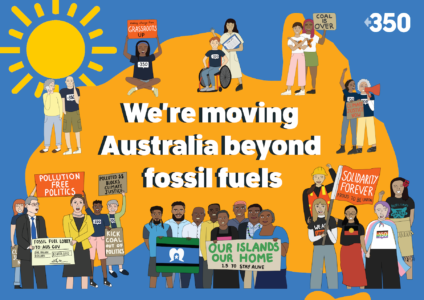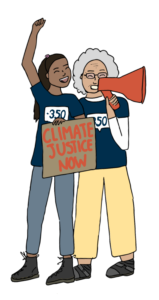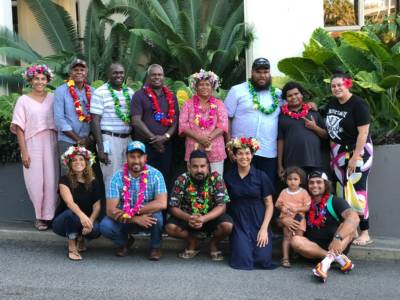A politics of hope for the new decade.
350.org Australia’s 2020-2022 strategic plan.
Read the whole plan here
What is a politics of hope?
A politics of hope is the feeling you get when you chant with a crowd of people at a rally knowing that you’re not alone. It’s the feeling of awe when you look around the world at all the individuals and communities striving to create a better world, and succeeding against all odds. It’s knowing deep in your heart that movements who resist the hoarding of power by a greedy few are the ones who bend the arc of history towards justice.
Hope sometimes feels impossible, and power holders try and make it feel that way everyday. They make you feel like the way the world is, is never going to change, it’s a natural way of being. A politics of hope is having the courage to look them in the eye and believe that every action we take towards justice will move us closer to dismantling their power and building our own.
It is not blind hope that is based on the luck of the draw. It’s hope that means another world might be possible, not promised, not guaranteed. Hope is people coming together in action; action inspires hope in others.
Our vision
Our vision is for a future that is just and equitable, with our communities and ecosystems thriving and protected from the impacts of climate change.
Our purpose
We are building a grassroots movement to stand up to the fossil fuel industry, and support a just transition from coal, oil and gas to a renewable energy future for all.
Our theory of change
We know that the climate crisis is about power — and not just the kind of power that runs our cars and keeps the lights on. We believe that the only way we’ll see meaningful action on climate change is if we can counter the power of big fossil fuel companies with the power of people taking collective action. That’s why we are building a grassroots movement that is big enough to shift power away from the big polluters who are driving the crisis, to the people on the frontlines building the solutions. We choose to focus on fossil fuels because the burning of coal, oil and gas is the biggest contributor to Australia’s domestic emissions, and our coal and gas exports are a huge source of global emissions. To see ambitious action on climate change, we must hold big fossil fuel corporations accountable
What we do:
Building a movement:
Building a grassroots movement is at the centre of everything that we do, because we know it’s only through people-power that we can achieve our vision for the future. Our movement is built through leaders forming local groups, and running strategic campaigns in their communities that are connected by a national and global strategy. This is supported by 350 staff, volunteer teams, digital tools, and a high quality training and mentoring program. Our movement currently comprises 12 groups across Australia made up of committed and skilled local leaders, and a community of active supporters of more than 60,000 individuals. Our movement is united around our mission, grounded in the realities of science and principles of climate justice, and is empowering and transformational for those involved.
Campaigning for impact
To achieve our vision requires rapid, ambitious, and science-based action from our governments and other institutional decision-makers – and these actions must be in line with the principles of climate justice. We know that to achieve this kind of change we must harness the people-power of our movement and channel it into strategic campaigns. Our campaigns win concrete outcomes that speed up the transition from fossil fuels to a renewableenergy future for all, and shift power from vested interests to those on the frontlines of the climate crisis. Our campaigns are built from the ground up, while staying united around common national and global goals. Our divestment campaign, for example, supported local groups to get their universities, councils, churches and schools to divest from fossil fuels, and connected these local campaigns to a global movement of groups all working towards the same vision.
Standing in solidarity
The climate crisis affects everyone, but not equally. Those who have done the least to cause the climate crisis are often hit first and worst by the impacts, and frontline communities are also doing the work of building the solutions that will truly address the root causes of the crisis. In Australia, standing with Aboriginal and Torres Strait Islander peoples is central to this work. 350.org Australia seeks to stand in solidarity with frontline communities, and as part of this we follow principles of climate justice within our movement-building work and our campaigns. We are also committed to going further, which means at key moments we show up in solidarity with First Nations peoples and all frontline communities, and throw our resources behind community-led campaigns. It also means continually doing the work within 350.org Australia to become a better ally to those on the frontlines of intersecting crises.
What is climate justice?
The climate crisis, at its core, is an issue of environmental and social justice. We understand that climate change has been driven by the unequal distribution of power in our society, and it impacts those most vulnerable, who did the least to cause the problem, first and worst.
The crisis of climate change is our greatest opportunity to change the systems that have harmed so many. We can have a better world, where communities are diverse, resilient and connected, where no matter the colour of your skin, your gender or sexuality, your class, or your ability you can thrive on your own terms.
Climate justice means building the power and voices of those who are most impacted by climate change and extractivism, and fighting for solutions to the climate crisis that don’t reinforce the broken systems of the past. It also means creating a grassroots movement that is inclusive, diverse and justice-centric.
We commit to standing in solidarity with communities, at the intersection of our issues, knowing that together we are stronger, and that no one is free until all of us are free.
Our 2020 - 2022 Strategic Plan
The landscape
The climate crisis is already here, the impacts are catastrophic, and we are on track to vastly exceed 1.5 degrees celsius of warming unless we rapidly accelerate global climate action.
At the time of writing this strategic plan in November 2019, catastrophic and unseasonable bushfires have caused tragedy and destruction across the eastern states of Australia. Water has run out or is running out in remote and regional communities, and even towns and cities. We have just recorded our first day ever without any rainfall on the mainland of Australia.
Yet despite these intensifying climate impacts, the grip of the coal and gas lobby on our politicians has never been clearer, and the newly elected Federal Government has wasted no time in trying to find new ways to prop up the fossil fuel industry and silence our movement.
What gives us hope, and a foundation for this strategy, is the incredible upswell of grassroots action that is taking place in Australia and around the world. As just one example, in the past year the school strike movement has grown to become one of the biggest social movements of our time.
What this shows is that we are facing tipping points not just within the climate system – grassroots movements around the world are also creating political and social tipping points, and through this strategic plan we aim to contribute to this momentum.
What we contribute
At 350.org Australia we see ourselves as one actor within a huge, powerful and visionary global climate justice movement. We have identified four core aspects of our niche within this broader movement:
- Our commitment to climate justice that puts solidarity with frontline communities at the centre of our work.
- Our focus on building a grassroots movement and our belief that it is only through people-power that we will achieve our vision.
- Our power analysis that holds the fossil fuel industry accountable for the climate crisis, and commits us to shifting power from vested interests to communities.
- Our connection to the global 350.org movement that brings with it enormous opportunities to increase our impact through collaboration.
We believe that we will create the most change when we focus on doing what we are best at, and collaborate with other organisations and groups working towards the same goals. Our understanding of our niche has guided the development of our focus areas in this plan.
We have chosen four focus areas that play to our strengths and work to mutually reinforce each other, detailed below. Our movement-building work provides the power we need to deliver outcomes; the Pollution-free Politics campaign focuses on the primary block to effective action on climate change in Australia; Our Islands Our Home addresses one of the most glaring failures in public policy due, in large part, to the influence of the coal and gas industries; and our commitment to support frontline community-led campaigns will ensure we deepen our climate justice work.
Focus area 1: Scaling up our movement
The moment we are in requires us to significantly accelerate action towards climate justice in the next three years, and this will require us to rapidly scale up our movement.
Our goals:
- Expand our local group network to 100 local groups
- Increase diversity within our movement and deepen our commitment to climate justice
- Build leadership and autonomy within our local group network
- Expand our base of active online supporters
Our organising principles:
Our organising approach is based on the following 10 principles, which all our leaders and local groups agree to work towards:
- We stand with frontline communities: The climate crisis and the fossil fuel industry impact our communities differently, and we take every opportunity to stand with those on the frontlines.
- We work towards justice within our movement: We prioritise resources towards building a network grounded in justice that draws strength from the diversity of lived experiences within our movement.
- We tell our stories: Stories are how we connect to each others’ values and build a big, strong and resilient movement.
- We are not afraid to polarise: We align ourselves with the vast majority of society who want to be part of the solution, and call out the small group of powerful vested interests standing in our way.
- We play to the public: Everything we do is about inviting the public to join the movement for climate justice.
- We focus on scaling up: Our job is to build a climate justice movement large enough to shift power from the vested interests of the fossil fuel industry to the communities on the frontlines of the crisis.
- We are collaborative: We seek to work together with the broader climate justice movement, and we are generous with our actions, resources and words.
- We build community: We regularly bring people together to share food, stories, art and songs.
- We engage in peaceful protest: As a charity, we engage in tactics of peaceful and non-violent protest that intentionally aim to halt business as usual for those profiting from the climate crisis.
- We build a politics of hope: We support people to understand the severity of the climate crisis, and fight despair through the politics of collective action and hope.
Digital growth
To build the power of our campaigns and our movement, we need to grow online, opening our doors to new supporters and giving people regular opportunities to take action to solve the climate crisis. As the nature of digital campaigns and social media changes, we’ll be nimble in adapting our campaigns, and innovate with tools that help grow a diverse movement of supporters who feel part of a powerful community.
Focus area 2: Pollution-free politics
The coal and gas lobby in Australia is incredibly powerful, and is one of the biggest barriers to ambitious policies that are in line with what climate science demands. The majority of Australians support stronger action on climate change, but politicians know that the fossil fuel lobby has the power to take down Prime Ministers and change the outcomes of elections.
In order to create a political environment in which the Australian Government can implement ambitious climate policies, it is essential that we diminish the power of the coal and gas lobby, and increase accountability of politicians to people rather than polluters.
This is why 350 Australia will campaign over the next three years to shift power from the fossil fuel lobby to communities working towards climate justice, by significantly reducing the capacity of coal and gas lobby groups to undermine effective government action on climate change.
Our goals:
- Pressure the membership of the fossil fuel lobby groups to leave on climate grounds
- Challenge the “revolving door” between politics, the bureaucracy, and the fossil fuel lobby
- Undermine the social license of the fossil fuel lobby
Key interventions:
- Corporate campaigns targeting members pressuring them to leave fossil fuel lobby groups on climate grounds, including a distributed community organising campaign calling for institutions to pledge not to associate with members of the lobby groups.
- Political campaigns calling on all politicians to pledge to sever ties with the fossil fuel lobby on climate grounds, and expose the harmful impacts of the revolving door between politics and the lobby groups.
- Ongoing and escalating peaceful protest, in partnership with frontline communities, that disrupts the fossil fuel lobby.
- A research and investigations program, supported by a media strategy, to expose and communicate the damaging influence of the fossil fuel lobby on Australian climate policy to key audiences.
Focus area 3: Our Islands Our Home
Torres Strait Islanders are on the frontline of the climate crisis, and urgent action is needed to ensure Torres Strait Islanders can remain on their Islands. Advancing seas are already threatening homes, as well as damaging fresh water supplies, crops, burial grounds and sacred cultural sites.
In a world first, claimants from the Torres Strait Islands have brought a human rights complaint against the Australian Federal Government to the Human Rights Committee of the United Nations over the Government’s inaction on climate change. The UN Human Rights Committee decision on the claim is expected in 2021.
350.org Australia is supporting a public campaign, with the overarching goal of amplifying momentum created by the legal case to win adaptation and mitigation commitments from the Australian Government (and Queensland Government where relevant) to protect the Torres Strait Islands from the climate crisis.
This campaign is in partnership with ClientEarth, the environmental law charity supporting the UN complaint, the land and sea council Gur A Baradharaw Kod; and the Seed Youth Indigenous Climate Network.
Our goals:
- Support Torres Strait Islanders to secure a commitment from the Federal Government for at least $50 million for climate adaptation measures for the Torres Strait Islands, spent in line with community priorities.
- Build support from political parties and the Australian public for ambitious policies that will reduce greenhouse gas emissions in line with its commitments to a 1.5 degree target under the Paris Agreement.
Key interventions:
- National speaking tours and public engagement events to build support and understanding of the campaign amongst the community.
- Supporting the storytelling of the campaign through the production of communications products, such as the production of high quality videos.
- Supporting advocacy work being done by Torres Strait Islanders to meet with politicians from all major parties and the crossbench to discuss the campaign demands.
- Mobilisation of the Australian community in support of the campaign at key moments with digital actions as well as actions and events.
Focus area 4: Solidarity with those on the frontlines
In addition to the campaigns outlined above, over the next three years we will engage in additional actions and campaigns in solidarity with those on the frontlines of the climate crisis, including communities impacted first and worst by fossil fuel mining, including Traditional Owners facing projects on their land; climate change impacts, such as our neighbours in the Pacific and survivors of bushfires and extreme weather events; and power generation, causing pollution and uncertainty for local communities.
This work will ensure that we maximise our impact by taking leadership from those who best understand this crisis and the solutions needed; remain adaptable to a changing external landscape; build a stronger and more diverse movement; and live our values of collaboration and commitment to climate justice.
Our goal:
Act in solidarity with individuals and organisations working on the frontline of the climate crisis.
Decision-making:
Decisions about resourcing these solidarity activities will be made by reference to the following guiding questions:
- Does this further our goal of climate justice?
- Does 350 Australia have the capacity to engage in a way that is meaningful and add real value to the campaign?
- Is this intervention consistent with our other strategic priorities and shift the narrative towards justice?
- Do we have sufficient capacity to maintain involvement or resources to a level that will support communities we are working with in the long-term?
- Does this enhance our relationships across the sector?
- Can we manage the risks associated with involvement?








